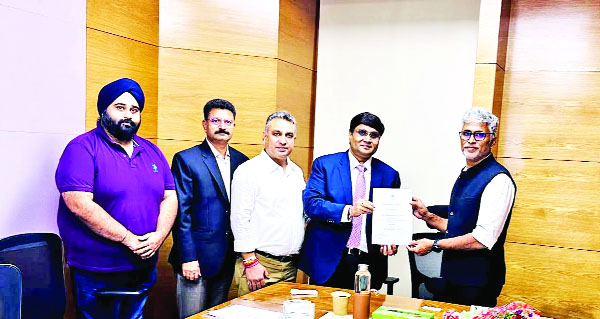Rahul Sahai Leads PHDCCI Jammu Delegation to Discuss Implementation of NCSS-2021 in J&K
DOGRA HERALD BUREAU
jammu, Sept 19
*Balamurugan D, IAS, Joint Secretary, Department of Promotion of Industry and Internal Trade (DPIIT), Government of India assured PHDCCI Jammu delegation that NCSS scheme will clear cases on Gross GST only .
- Implement a Flexible Capping Mechanism , If capping the GSTLI is necessary, develop a mechanism that protects MSMEs and accommodates applications submitted by the September 30, 2024 deadline and accommodate all small units .
Rahul Sahai, Chairman of the PHD Chamber of Commerce and Industry (PHDCCI) Jammu, led a delegation to meet Shri Balamurugan D, IAS, Joint Secretary, Department of Promotion of Industry and Internal Trade (DPIIT), Government of India. The meeting focused on the implementation of the New Central Sector Scheme for Industrial Development of Jammu & Kashmir (NCSS-2021) and the critical concerns surrounding proposed changes to the scheme.
The delegation, representing the industrial and service sectors of Jammu & Kashmir, presented a detailed memorandum that highlighted the growing apprehension regarding the conversion from Gross GST to Net GST under the NCSS-2021.
Rahul Sahai expressed deep concern, stating that these changes could severely impact the viability of existing and upcoming projects in the region. He emphasized that the NCSS-2021, introduced after the abrogation of Article 370, was designed to offset the region’s higher production costs due to logistical challenges, labour costs, and land acquisition difficulties. The scheme had successfully attracted both large and small investors, creating new employment opportunities and economic growth in J&K.
Sahai warned that the proposed reduction in incentives could jeopardize the entire scheme’s purpose. Industries with low-value additions or inverted duty structures are especially vulnerable to these changes, potentially leading to business closures and reduced investments. This is particularly concerning for sectors like pharmaceuticals, which are heavily reliant on the original incentive framework. According to an internal analysis, the proposed changes may drastically reduce incentives, leading to the scheme’s ineffectiveness.
As the deadline for registration under the scheme approaches, many businesses in Jammu & Kashmir are still in the process of securing basic infrastructure like land, power, and water. With around 680-700 applications expected from the Jammu division alone by September 30, 2024, Sahai urged the government to extend the application deadline. With an increase in the budget allocation, nearly 50% of applicants could miss out on the incentives if not extended . Additionally, with the scheme’s liability estimated to reach ?1 lakh crore, the delegation stressed the need for an extension and additional funding to ensure that all eligible units can benefit from the scheme.
To address these pressing issues, Sahai and the PHDCCI delegation recommended the following:
- Retain the Original GSTLI Incentive: Continue offering 300% of the capital investment under the GSTLI for a period of ten years to ensure the viability of current and future projects.
- Extend the Deadline: Provide an extension for submitting applications under NCSS-2021, especially for businesses that have already made significant investments but are awaiting registration.
- Increase the Budget Allocation: Allocate additional funds to ensure that all eligible applicants receive the promised incentives.
- Implement a Flexible Capping Mechanism: If capping the GSTLI is necessary, develop a mechanism that protects MSMEs and accommodates applications submitted by the September 30, 2024 deadline.
- Review of the FIFO System: Ensure that units with false documentation are deprioritized in the clearance process, allowing genuine applicants to benefit from the scheme. Rahul Sahai concluded by emphasizing the importance of maintaining investor confidence in the government’s commitment to industrial growth in Jammu & Kashmir. The continuation of the NCSS-2021 scheme in its original form is crucial for ensuring the region’s economic development and long-term prosperity.



























